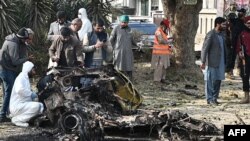Pakistani authorities said Friday a suicide bomber traveling in a car blew himself up at a police security checkpoint in the capital, Islamabad, killing an officer and wounding 10 people.
The outlawed Pakistani Taliban or Tehrik-i-Taliban Pakistan, known as the TTP, swiftly took responsibility, saying one of its members carried out the attack.
Sohail Zafar Chattha, the Islamabad deputy city police chief, told reporters near the crime scene that a “suspicious car” was ordered to stop at the checkpoint and its “long haired” male passenger was being searched when he detonated an explosive device.
Doctors at a main Islamabad hospital said they had received 10 injured, including six civilians and four policemen, describing condition of some of the security personnel as “critical.”
Chattah said investigators had retrieved body parts of the bomber and his suspected female partner, but it was not immediately clear whether the explosives were strapped to the body of the suspected attacker or placed inside the vehicle.
Television footage showed wreckage of the destroyed car.
The TTP said in its statement sent to reporters that the attack was the work of one suicide bomber.
Pakistani Prime Minister Shahbaz Sharif condemned the violence and praised the police for stopping “the terrorists by sacrificing their blood and the nation salutes its brave men.”
The TTP, also designated as a global terrorist group by the United States, has lately intensified attacks in Pakistan, killing hundreds of people, mostly security forces, this year.
On Sunday, dozens of TTP inmates at a counterterrorism detention center in the northwestern garrison city of Bannu took eight security officers hostage and demanded safe air passage to neighboring Afghanistan.
Pakistani authorities unsuccessfully tried to negotiate the release of the hostages before ordering army commandos to storm the compound on Tuesday. The military said the ensuing intense clashes had killed 25 high-profile TTP detainees while 10 others were captured. At least five security forces and three hostages were also killed in the shootout.
The militant violence has dramatically surged since late November, when the TTP ended its monthslong unilateral cease-fire with the government, accusing authorities of not meeting their demands.
The TTP is a known Pakistani offshoot and close ally of Afghanistan’s ruling Islamist Taliban. Noor Wali Mehsud, the fugitive chief of the Pakistani Taliban, and his top commanders are based in the neighboring country from which they are directing terrorism against Pakistan.
The Pakistani foreign ministry spokesperson told a regular news briefing on Thursday that Islamabad had conveyed its terrorism and border security concerns to the Taliban government in Kabul and “received some assurances” from them.
"We have certain mechanisms with Afghanistan in which we engage to discuss these issues,” Mumtaz Zahra Baloch said. “We will continue to engage with them to ensure that the Afghan authorities fulfill the commitments that they have made to Pakistan that Afghan territory will not be used to destabilize or to threaten Pakistan's security,” she added.
The Taliban maintain they are not allowing any groups, including TTP, to threaten Pakistan or other countries from Afghanistan's soil, in line with their counterterrorism commitments to the neighboring country and the world at large.




